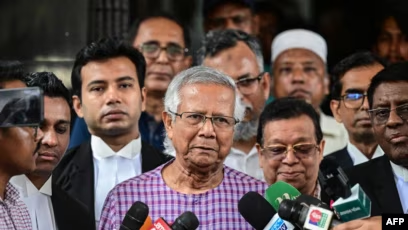Bangladesh’s political landscape has been reshaped as Nobel laureate Muhammad Yunus is set to head the country’s interim government. This development comes in the wake of former Prime Minister Sheikh Hasina’s resignation and subsequent flight from the country amid widespread protests, primarily led by students. The Yunus leads Bangladesh transition marks a significant moment in the nation’s history, potentially ushering in a new era of governance and social change.
The Rise of Student-Led Protests
The catalyst for this political upheaval was a mass uprising against Sheikh Hasina’s rule, spearheaded by student activists. These protests, which gained momentum over recent weeks, reflected growing discontent with the government’s policies and alleged authoritarian tendencies. The students’ persistent demonstrations and their ability to mobilize large sections of the population ultimately forced a change in leadership.
As tensions escalated, a crucial meeting took place at the president’s official residence. This gathering brought together an eclectic mix of stakeholders, including student protest leaders, military chiefs, civil society members, and business leaders. For over five hours, they deliberated on the future direction of the country and the selection of an interim leader.
The Choice of Muhammad Yunus
The decision to appoint Muhammad Yunus as the head of the interim government was announced by Joynal Abedin, the press secretary of President Mohammed Shahabuddin. Yunus, an 83-year-old microfinance pioneer, had been proposed by the student protesters and reportedly agreed to take on the role. His selection represents a significant shift from the previous administration, given his long-standing criticism of Hasina’s governance.
Yunus’s reputation as a Nobel Peace Prize laureate, awarded in 2006 for his groundbreaking work in microcredit and poverty alleviation, lends credibility to the interim government. His Grameen Bank, founded in 1983, revolutionized small-scale lending to entrepreneurs, particularly women, who would typically be excluded from traditional banking systems. This innovative approach to economic empowerment has been replicated in numerous countries, cementing Yunus’s status as a global figure in social development.
Challenges and Controversies
Despite his international acclaim, Yunus’s path to leadership has not been without obstacles. His relationship with the outgoing administration, particularly with Sheikh Hasina, has been fraught with tension. Hasina’s government launched a series of investigations into Yunus beginning in 2008, accusing him of various improprieties in his management of Grameen Bank and other associated companies.
These legal challenges culminated in several high-profile cases against Yunus. In 2013, he faced charges of receiving money without government permission, including his Nobel Prize winnings and book royalties. More recently, in 2023, former employees of Grameen Telecom accused him of misappropriating their job benefits. Yunus has consistently denied all allegations, maintaining that these legal actions were politically motivated due to his critical stance towards Hasina’s government.
As Yunus leads Bangladesh transition, the country stands at a crossroads. The appointment of a figure with international stature and a history of social entrepreneurship signals a potential shift towards more inclusive governance and economic policies. However, the challenges ahead are significant, including healing political divisions, addressing economic disparities, and navigating the complex legal landscape that Yunus himself has been embroiled in.
The coming weeks and months will be crucial in determining whether this transition can bring about the change that protestors have been demanding. As Bangladesh embarks on this new chapter, the world watches with interest to see how Yunus’s leadership will shape the nation’s future. The success of this interim government could set a precedent for peaceful transitions of power in the region and demonstrate the impact of civil society and student movements in effecting political change.
Related News
















